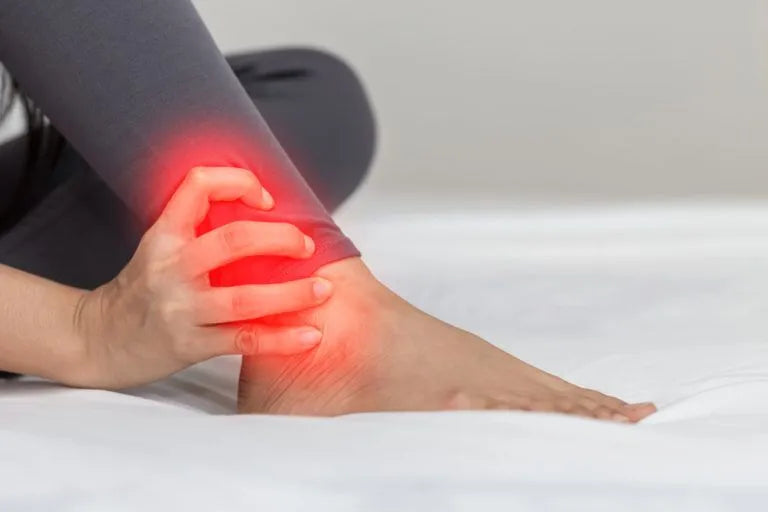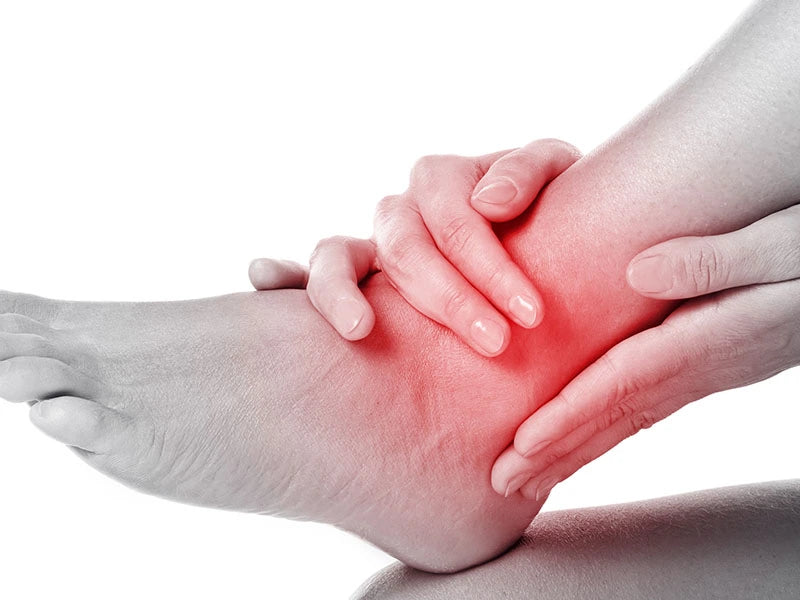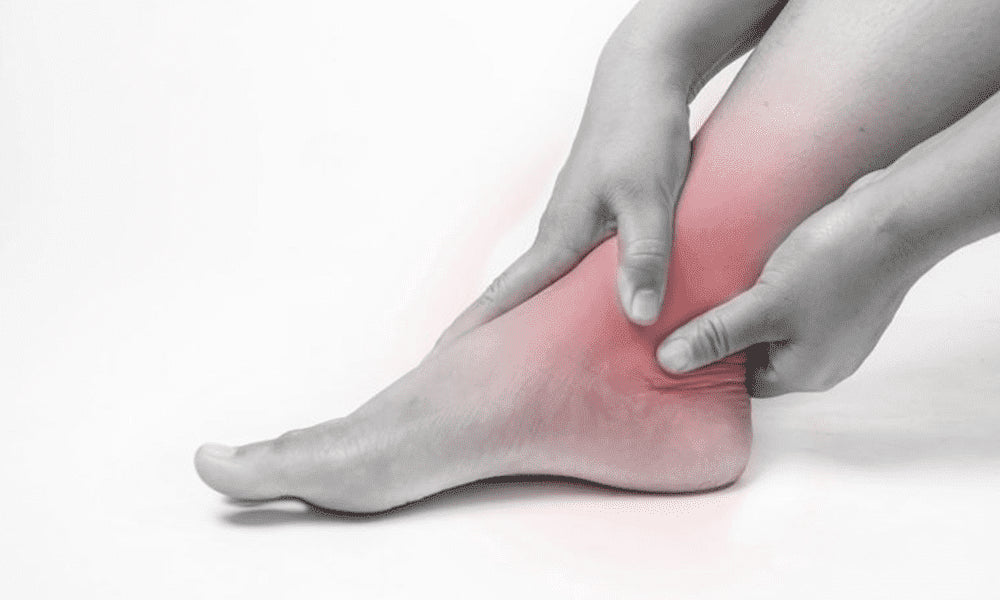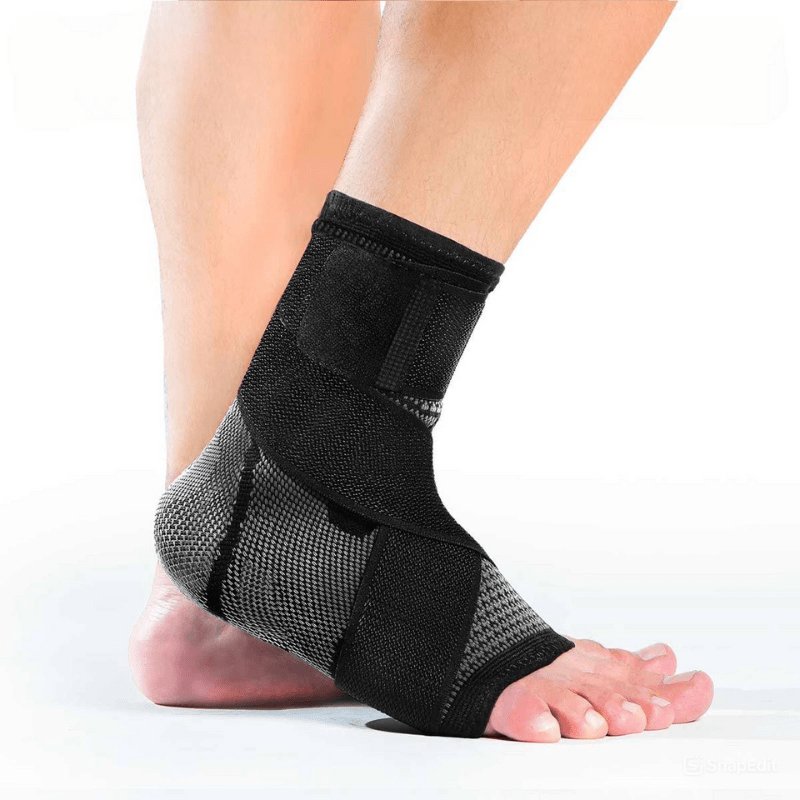Ankle Pain: Causes, Symptoms, and Effective Treatments
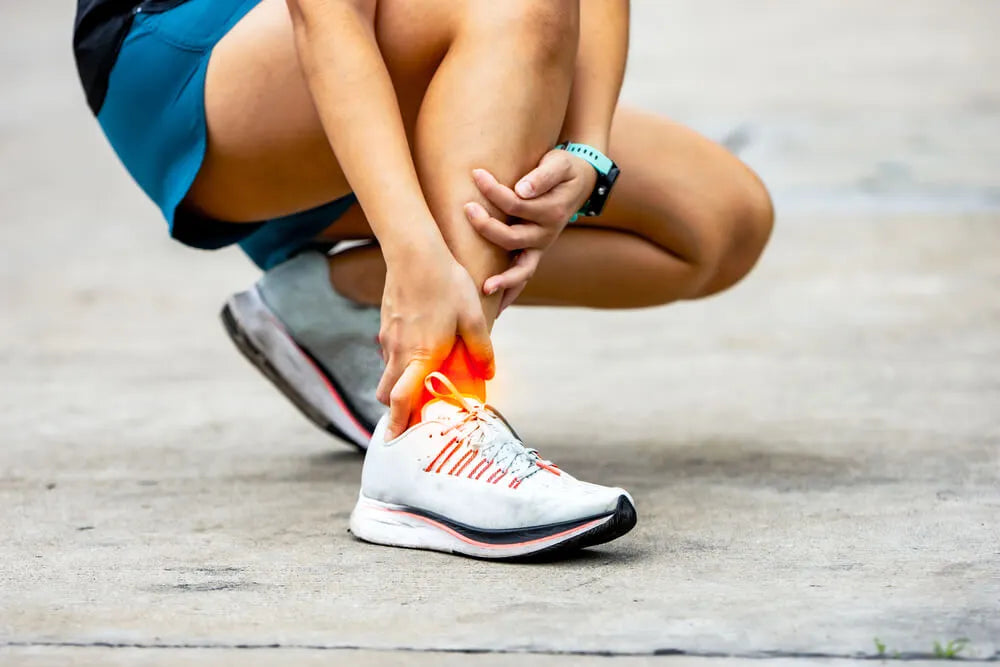
Ankle pain can really hinder your daily life. Have you ever experienced a discomfort that makes it difficult to walk or stand? Whether the pain is sudden or chronic, it can affect your daily routine and quality of life. In this guide, we explore the most common causes, symptoms, and treatments for foot pain. Read on for valuable tips on how to manage and prevent ankle pain.
What is ankle pain?
Ankle pain occurs in or around the ankle and can be due to injuries, overexertion, or health conditions such as arthritis. The pain varies in intensity and duration, from mild and temporary to severe and long-lasting. Regardless of the cause, this pain can affect your mobility and quality of life, making it difficult to perform daily activities. Identifying the cause of the pain is crucial for effectively treating it and regaining full function in the foot.
Symptoms of Ankle Pain
Recognizing the symptoms of ankle pain is important for effective treatment. Common signs of ankle problems include:
- Swelling: The ankle may become swollen and tender.
- Stiffness: Stiffness, especially in the morning or after resting.
- Pain with weight bearing: The pain may worsen when walking or standing.
Types of Pain in the Neck
Ankle pain can manifest in various ways, depending on the cause and severity. Understanding the different types of pain can help you identify the issue and find the right treatment. Here is an overview of the most common types of ankle pain.
Sudden Pain in the Ankle
This type of pain often occurs after an injury, such as a sprain or a fall. The pain is intense and can make it difficult to bear weight on the foot.
Ankle Gives Way in Pain
This happens when the ankle feels unstable and gives way under load. It is common with ligament injuries or after repeated sprains.
Sharp Pain in the Ankle
A sharp, shooting pain that may occur with certain movements. This type of pain is often related to nerve involvement or inflammation.
Pulsating Pain in the Ankle and Heel
This pain feels like a throbbing ache that can extend from the ankle to the heel. It may be a sign of inflammation or overuse.
Pain and Stiffness in the Ankle
A combination of pain and stiffness that makes it difficult to move the ankle. This is common with arthritis or after prolonged inactivity.
Burning Pain in the Ankle
A burning sensation that may be constant or occur with certain movements. This type of pain may be related to nerve damage or inflammation.
Comparison Table of Types of Pain in Ankle
| Typ av smärta | Beskrivning | Vanliga orsaker | Intensitet | Varaktighet | Påverkan på rörlighet |
|---|---|---|---|---|---|
| Plötslig smärta i fotleden | Intensiv smärta efter en skada | Stukning, fall | Hög | Kort | Hög |
| Fotleden viker sig i smärta | Instabilitet och viker sig under belastning | Ligamentsskador, upprepade stukningar | Medel | Varierande | Hög |
| Ilande smärta i fotleden | Skarp, ilande smärta vid rörelse | Nervpåverkan, inflammation | Hög | Kort | Medel |
| Pulserande smärta i fotleden och hälen | Pulserande värk från fotleden till hälen | Inflammation, överbelastning | Medel | Lång | Medel |
| Smärta och stelhet i fotleden | Svårighet att röra fotleden | Artrit, långvarig inaktivitet | Medel | Lång | Hög |
| Svidande smärta i fotleden | Brännande eller svidande känsla | Nervskador, inflammation | Hög | Varierande | Medel |
There are many different causes of ankle pain, and identifying the exact cause can help you find the right treatment. Common causes include:
- Sprains and Strains: Caused by twisting or rolling the foot, which injures the ligaments.
- Fractures: Bone breaks, often due to trauma or accidents.
- Arthritis: Inflammation in the joints, including osteoarthritis and rheumatoid arthritis.
- Tendinitis: Inflammation of the tendons, often due to overexertion.
- Bursitis: Inflammation of the bursae, small fluid-filled sacs that cushion bones, tendons, and muscles.
- Infections: Bacterial or viral infections affecting the area.
- Nerve Compression: Conditions like tarsal tunnel syndrome where nerves are compressed.
- Overuse: Repeated strain from activities such as running.
Preventing ankle pain is key to keeping your feet and ankles healthy and strong. Here are some effective tactics:
- Wear supportive shoes: Choose shoes with good support and cushioning. Avoid high heels and flat sandals that lack support.
- Warm up properly: Before physical activity, warm up your muscles and joints with light jogging, stretching, and dynamic movements.
- Vary your activities: Avoid doing the same type of exercise every day. Combine running with cycling, swimming, or strength training.
- Perform strength and balance exercises: Strengthen your ankles with exercises like calf raises, balancing on one foot, and using balance boards.
- Maintain a healthy weight: A balanced diet and regular exercise reduce the strain on your ankles.
- Use orthotics if needed: If you have had previous injuries or feel instability, orthotics or ankle supports may be helpful.
There are several different methods to treat ankle pain, and the best treatment depends on the cause and severity of the pain. Here is an overview of the most common treatment methods.
Behandlingsmetoder
| Behandlingsmetod | Effektivitet | Kostnad | Återhämtningstid | Risker/Biverkningar | Användningsområde |
|---|---|---|---|---|---|
| Vila och avlastning | Hög vid mindre skador | Låg | Lång | Ingen risk för biverkningar, men muskelsvaghet | Mindre skador, överansträngning |
| Is och kompression | Minskar svullnad snabbt | Låg | Kort | Hudirritation om det används för länge | Akuta skador, svullnad |
| Smärtstillande mediciner | Snabb lindring | Låg till medel | Kort | Magbesvär, beroendeframkallande vid långvarig användning | Akut smärtlindring, inflammation |
| Fysioterapi | Mycket effektiv | Medel till hög | Medel till lång | Kräver tid och engagemang, kan vara smärtsamt i början | Rehabilitering, långvarig smärta |
| Kirurgi | Mycket hög vid allvarliga skador | Hög | Lång | Risk för komplikationer och infektioner, kräver rehabilitering | Allvarliga skador, misslyckad konservativ behandling |
Choosing the right treatment for your neck pain depends on your specific needs and symptoms. Always discuss with a doctor or specialist to find the best solution for you.
Komforten Relief for Ankle
For those suffering from ankle pain, Komforten offers an effective solution with our product Fotsupporten™. This product is designed to provide optimal comfort and support for your feet and ankles.
Fotsupporten™ has several features that help relieve ankle pain:
- Ergonomic Design: Adapts to the natural shape of the foot for maximum support and reduced strain.
- Compression Material: Reduces swelling and improves blood circulation, speeding up recovery.
- Adjustable Straps: Makes it easy to customize the support according to your needs and ensures a perfect fit.
The benefits of using Fotsupporten™ include:
- Pain Relief: Reduces pain and stiffness in the ankle by providing stability and support.
- Improved Mobility: Helps you move more freely and comfortably, even during activities that may cause strain.
- Injury Prevention: By providing extra support, it reduces the risk of your ankle giving way or sustaining new injuries.
would you like to experience the benefits of Fotsupporten™ yourself? Visit our product page to learn more and order your own today. Give your feet and ankles the care they deserve with Komforten!
Frequently Asked Questions
Here we have gathered some of the most common questions about ankle pain and how you can manage it.
How does ankle pain feel?
Ankle pain can vary depending on the cause and severity. Common characteristics include:
- Swelling and tenderness around the area.
- Stiffness that makes it difficult to move the foot.
- Sudden pain after an injury.
- Sharp pain with certain movements.
- Pulsating pain that may feel like a throbbing pulse and extend to the heel.
- Burning pain that can be constant or occur with specific movements.
How can I relieve ankle pain?
There are several ways to relieve ankle pain. Here are some effective methods:
- Use Supportive Shoes: Choose shoes with good support and cushioning. Avoid high-heeled shoes and flat sandals.
- Warm Up Properly: Do light jogging, stretching, and dynamic movements before physical activity.
- Vary Your Activities: Combine different forms of exercise such as running, cycling, and swimming to avoid overuse.
- Perform Strength and Balance Exercises: Do exercises like calf raises and balancing on one foot to strengthen the ankles.
- Maintain a Healthy Weight: A balanced diet and regular exercise reduce the strain on the ankles.
- Use Orthotics if Needed: Use ankle supports if you have had previous injuries or feel instability.
Can I exercise with ankle pain?
It depends on the cause and severity of your ankle pain. Here are some guidelines:
- Light Exercises: If the pain is mild, you can try low-impact activities like swimming or cycling that don't put strain on the foot.
- Avoid High-Intensity Activities: Avoid running, jumping, and other activities that may worsen the pain.
- Consult a Physiotherapist: A physiotherapist can provide you with specific exercises that are safe to perform and can help strengthen the area.
- Use Support: Use support products like Fotsupporten™ to provide extra stability during exercise.

